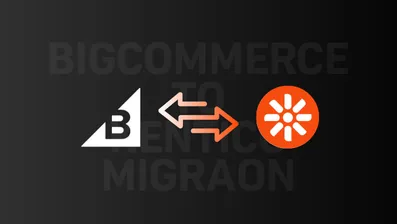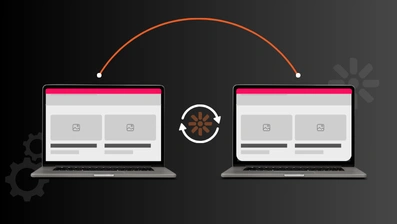Over 78 million websites on the internet use a content management system, and that number continues to grow every year.
But here's the problem: with so many options out there, choosing the Right CMS Platform in 2026 is no longer as simple as it once was.
With new tech trends, AI tools, and evolving digital experiences, the CMS landscape looks nothing like it did just a few years ago.
You are not only picking a content tool, but a full foundation for your digital presence.
If you are running an enterprise, it adds to a different layer of stress. You want a new system to be flexible, scalable, secure, and easy for your current team to use.
But with so many CMS options out there, from headless CMS to cloud-based solutions, where do you even start?
Don't worry.
This guide breaks it all down and helps you understand what will really matter in selecting your next CMS, while also understanding how to decide what fits your long-term game plan.
What is a Content Management System?
A Content Management System (CMS) is an application that makes it easy to create, publish, manage, and update a website without the need for writing any code.
It's the only platform that you will need to create pages, publish blogs, add media, control styling, and more, all using an easy-to-learn platform.
What a great CMS offers you the most is ease and speed. You no longer have to rely on developers for every small change; you can edit, update, and publish content yourself in minutes!
Ultimately, a CMS puts the power of website management back in your hands, allowing your team to focus on creativity, content, and customer engagement instead of technical challenges.
Features of CMS
As you evaluate CMS options, it’s important to consider features beyond design or publishing tools. The correct CMS for your organization is one that streamlines management, enhances collaboration, and grows with your business. Here are the features we recommend seeking out:
Easy-to-Navigate Dashboard: A streamlined and easy-to-navigate dashboard allows you to manage pages, users, and media without becoming lost in unnecessary complexity.
Content Editing Tools: Drag-and-drop editors and WYSIWYG interfaces allow your team to easily create and update content within the CMS without needing to know how to code.
User Roles & Permissions: User roles such as editor, admin, or contributor allow you to hold some authority for safe collaboration.
SEO Management: Most CMSs have built-in SEO tools so you can easily set your content up in whatever way will drive traffic and boost the visibility of your site.
Scalability & Integration: The most popular CMSs allow for integrations with CRMs, ERPs, and marketing tools, which makes it easier for you to sync your systems and build regarding scalability.
Security & Backup: Automated backups and constant updates, along with multi-layer authentication, will keep your content and user data safe and secure.
A CMS that is rich in features will not only make managing your website easy, but will also give you a safe, secure, scalable, and future-proof digital presence.
After features, let’s find out.
Why is Choosing the Right CMS Important?
Your website is the heart of your online presence; it’s where your brand communicates, converts, and grows.
But without the right system to manage it all, things can quickly become messy and inefficient.
That’s why choosing the right CMS (Content Management System) is so important.
The biggest advantage that a great CMS gives you is control over your content, your SEO, and the overall user experience.
A reliable CMS doesn’t just make publishing easier; it helps your entire team work smarter, streamline processes, and adapt faster to market changes.
Here are four key factors you should always consider when choosing your CMS software in 2025.
1. Flexibility and Scalability
Your chosen platform must handle increasing traffic and content volume without performance dips.
For enterprises with diverse digital properties or plans for global expansion, looking into solutions that offer robust scaling capabilities, such as those provided by a dedicated CMS Development Company, is crucial.
A system that can evolve with your needs prevents the costly and disruptive need for frequent replatforming.
2. Ease of Use and Accessibility
A powerful CMS doesn’t have to be complicated.
When choosing the right content management system, go for one that feels intuitive for your team, whether they’re marketers, writers, or developers.
The goal is to make publishing content, updating pages, and managing media as easy as possible.
A system that saves you time helps you focus on what truly matters, engaging your audience and growing your brand.
3. Security and Support
Your website’s security is non-negotiable.
When choosing the right CMS, always check how well it handles threats like hacking, data breaches, and plugin vulnerabilities.
Also, look for a CMS that offers strong community or vendor support.
Because when something breaks (and it will), having quick, reliable help is the difference between a five-minute fix and a five-day panic.
4. Integration and Customization Capabilities
In 2025, digital ecosystems will be more connected than ever.
So when choosing the Right CMS Platform in 2025, make sure it integrates seamlessly with your marketing tools, CRMs, analytics, and automation software.
You don’t want a system that locks you into rigid structures; you need one that bends with your workflow.
The right CMS should empower you to personalize user experiences, automate tasks, and connect every part of your digital strategy.
Furthermore, for those exploring modern architectures, a provider offering Headless CMS Development services can ensure maximum flexibility for omnichannel delivery.
At the end of the day, choosing the right CMS isn’t just a technical decision; it’s a strategic one.
It shapes how your team works, how your customers experience your brand, and how fast you can move in an ever-changing digital landscape.
How to Choose the Right CMS?
Let's be honest– getting the optimal CMS is not just a matter of picking what's new and trendy; it is about finding the right fit.
The real objective is to pick the best CMS for your business that aligns with your brand's goals, helps to create simpler workflows, and scales with you.
Here are key points on how to confidently select the right CMS that "works smarter, not harder" for your website:
1] Define Your Business Goals
Before you select the best CMS for your business, you want to be clear on what you are trying to accomplish.
Do you want to build an online store, a blog, or a website for enterprise-level visitors? Each CMS has its own particular purpose.
WordPress is great for a blog, while Kentico or Sitecore create enterprise-level websites. When your respective CMS is aligned with your business goals, you will have fewer integration issues and a more stable deployment.
You want to order a system that enables growth, not one that restrains your creativity or scalability as your digital footprint grows.
2] How Easy Is It to Learn
Ease of use should be near the top of your list in your quest for the best CMS. If your content team is fighting through a complicated backend, it will frustrate them, slow down all updates, and reduce productivity.
The ideal CMS will have easy-to-use interfaces, a drag-and-drop editor, or customizable dashboards.
Spend some time evaluating each one, and you’ll get a sense of the one that feels the most intuitive. The easier it is for your non-technical team members to publish, edit, and manage content, the easier the workflow will be.
Although simplicity does not mean a reduction in features, it means an improvement in your team's ability to focus on being creative in your online communications, instead of focusing that energy on mastering technical challenges.
3] Check Customizability and Flexibility
Part of the decision-making process lies in the flexibility of the CMS.
You should be able to change designs, have custom templates, add plugins, and integrate an external system, where needed.
Building custom templates, customizing user experiences, and adding marketing tools are part of your normal work, so your CMS should suit your changing needs over time.
A CMS that has a rigid structure can easily constrain you to layouts or designs that are outdated.
One of the huge reasons to choose a great CMS is that it can evolve along with your brand to support your growth without having a continuous need for redevelopment or costly replacements of the system.
4] Think About Scalability for Future Growth
When considering the right CMS for you, think beyond now. A CMS that can help you scale your business when needed must also be able to handle growing traffic, multiple sites, and complex workflows.
Enterprise-level CMS platforms like Kentico or Drupal have scalability for large teams and global operations.
A site that can scale means not sacrificing user experience, especially if the traffic doubles or triples from the fabricated content.
If you are expanding your stores online, or launching sites regionally, the CMS you choose should handle all the technical transition without a website support team, at least until you want to expand features with a minimal vision advanced support team.
5] Evaluate Security Features
The most significant benefit of a CMS is its strong security. With cyber threats emerging every day, you need your CMS to defend against vulnerabilities, data breaches, and unauthorized access.
Look for features such as multi-factor authentication, routine security patches, SSL features, and role-based permissions.
When processing user data and payment information, compliance with GDPR or ISO certification is essential.
Plus, consider how often the CMS provider regularly updates and their track record for executing updates to resolve security concerns.
Partnering with experts who offer Kentico maintenance services ensures your platform remains protected, optimized, and up to date with the latest security enhancements.
A secure CMS does more than protect your digital content; it protects your brand equity and customer loyalty.
6] Consider Integration Options
An ideal CMS selection needs to include seamless integration into any existing tools or workflows.
Your CMS should integrate with CRMs, marketing automation solutions, analytics platforms, and eCommerce.
The CMS should allow integration with systems like Dynamics 365, Salesforce, or HubSpot, providing a large unified integrated ecosystem to support your operational throughput and productivity.
A CMS that supports API and plugin capability is also an easier way to grow your CMS feature set as your needs continue to develop. Integration should not just be an added benefit; it is valuable connections that ensure data flows smoothly across business operations.
7] Analyze Costs and ROI
Cost is a critical consideration to take into account when selecting the right CMS for your organization.
To effectively evaluate costs, you must consider not only the licensing fee to get started with a CMS, but also the costs incurred for hosting, customization, maintenance and upgrades, and proper support.
Utilizing an open source CMS may superficially look free, but content managers may incur more costs than a commercially available CMS while needing to hire a developer repeatedly.
Alternatively, a paid CMS provider will likely offer consistent, thorough support and may allow for better scalability and ROI.
The ultimate goal is to settle on a system that gives you value for your money--reasonable cost and the features and flexibility that work for your organization.
8] Check Support and Community
When you are looking for the best CMS to suit your needs, there is nothing like having reliable support and strong community involvement.
IT support teams, who are responsive, ensure that you are never alone when it comes to downtime or technical issues.
If you become acquainted with and use an open source CMS regularly, you will have the advantage of an active developer community around you for updates to the software, endlessly working to improve it, and usually providing troubleshooting help.
Simultaneously, the larger enterprise CMS usually provides a well-established customer support service that is available 24/7 and provides training as well.
They help ensure you overcome issues expeditiously, and if there is documentation readily available, you will always be able to problem-solve.
Now, with this being clear, let’s get to know some popular CMS platforms and how they can be of help.
Popular CMS Platforms to Consider in 2026
Let’s be honest, picking from all the top CMS platforms out there can feel like shopping for a phone.
So many options, each claiming to be “the best.”
To make things easier, here’s a breakdown of the most popular CMS platforms in 2026, the ones that actually help you build, manage, and scale your website without the usual tech stress.
1, Kentico Xperience
Kentico Xperience is where enterprise-level performance meets all-in-one convenience.
Unlike basic CMS tools, this one blends content management, marketing automation, and digital commerce in a single platform.
It’s designed for businesses that crave personalization, scalability, and security, all backed by an intuitive interface.
At DotStark, we help brands seamlessly transition to this powerful ecosystem through our Kentico migration services, ensuring zero downtime, data integrity, and a smooth upgrade to a smarter digital experience.
As one of the top CMS platforms for enterprises, Kentico helps you deliver tailored digital experiences that grow with your brand.
Features:
Built-in marketing and automation tools
Multilingual and multi-site capabilities
Integration with CRM and cloud services
Robust security and performance
Why Choose: Choose Kentico if you want a future-ready CMS that scales with your business vision.
2, WordPress
If there’s one name that defines content management system platforms, it’s WordPress.
It’s user-friendly, flexible, and open-source, ideal whether you’re a blogger, small business, or full-scale enterprise.
You can launch a website quickly and customize every detail with themes, plugins, and visual editors.
WordPress makes content creation effortless and helps you manage your digital presence without technical stress. No surprise it powers over 40% of the web.
Features:
Thousands of plugins and themes
SEO-optimized structure
Easy-to-use Gutenberg editor
Massive support community
Why Choose: Perfect if you want a simple, scalable, and creative CMS for any type of website.
3. Drupal
Looking for a CMS that offers power and precision? Drupal’s your guy.
This open-source platform is a developer’s dream, highly customizable, incredibly secure, and built for large-scale websites.
It’s not just one of the best CMS platforms; it’s the choice for government agencies, universities, and enterprises.
Drupal gives you unmatched control over structure, permissions, and performance.
If you’re all about flexibility, Drupal’s architecture lets you build almost anything you can imagine.
Features:
Extremely secure and reliable
Custom modules for tailored features
Scalable for high-traffic sites
API-friendly and multilingual
Why Choose: Ideal if you need enterprise-level flexibility, customization, and security.
4. Joomla!
Joomla! sits comfortably between WordPress and Drupal, giving you flexibility without overwhelming complexity.
It’s one of those popular CMS platforms that feels both technical and creative, offering tons of customization while still being approachable.
Perfect for community-driven, educational, or membership-based websites, Joomla combines user management, SEO tools, and design options effortlessly.
If you enjoy having control without needing a full-time developer, Joomla hits the sweet spot.
Features:
Native multilingual support
Advanced user and access control
Powerful extensions ecosystem
SEO-friendly structure
Why Choose: A great pick if you want a CMS that balances control and simplicity beautifully.
5. HubSpot CMS Hub
If marketing is your focus, HubSpot CMS Hub is your digital best friend.
It’s one of the best CMS platforms that blends website creation, SEO, and marketing automation into one hub.
You can build beautiful, conversion-driven pages while tracking leads and customer behavior in real time.
HubSpot CMS Hub connects seamlessly with its built-in CRM, making it perfect for businesses that thrive on data-driven decisions and personalized marketing experiences.
Features:
Integrated CRM and analytics
Built-in SEO optimization tools
Smart content and personalization
Cloud-hosted and secure
Why Choose: Perfect for marketers who want everything, content, automation, and analytics, in one place.
6. Wix
If you want to launch fast without coding headaches, Wix is a dream come true.
It’s one of the top CMS platforms for small businesses, creatives, and entrepreneurs who want simplicity with style. You can drag, drop, and publish in minutes, no technical expertise needed.
With AI-powered design and built-in SEO features, Wix gives you everything you need to go live confidently. It’s the definition of “website made easy.”
Features:
Drag-and-drop builder
AI-based design assistant (Wix ADI)
Built-in hosting and security
App integrations for added functionality
Why Choose: Choose Wix if you want a quick, no-code way to create a professional website.
7. Squarespace
For designers and visual storytellers, Squarespace is pure magic.
It’s one of the most popular CMS platforms for creatives who want stunning websites that look and feel premium.
Every template is beautifully responsive and easy to customize. Whether you’re running an online store, portfolio, or blog, Squarespace handles it all from hosting to analytics in one elegant package. You focus on content; Squarespace takes care of the rest.
Features:
Gorgeous, responsive templates
Built-in SEO and analytics
All-in-one hosting and SSL security
Drag-and-drop design tools
Why Choose: Choose Squarespace if you want design perfection without the technical fuss.
8. Sitecore Experience Platform
Sitecore is the powerhouse of content management system platforms, built for enterprises that mean business.
It combines content, analytics, and personalization to deliver next-level digital experiences. Whether you’re managing global websites or running large-scale campaigns, Sitecore gives you total control.
It’s data-driven, scalable, and integrates perfectly with marketing automation and CRM tools. If you want to delight users across every touchpoint, Sitecore leads the way.
Features:
Omnichannel content delivery
Deep CRM and analytics integration
Real-time personalization
Cloud scalability
Why Choose: Perfect for large enterprises aiming for intelligent, personalized customer experiences.
9. Shopify
Shopify is the heart of eCommerce innovation.
It’s one of the best CMS platforms for building online stores, fast, secure, and scalable. You don’t need coding knowledge to start selling; Shopify handles everything from payments to shipping.
Its sleek dashboard, templates, and integrations make it perfect for both startups and big brands. Whether you sell handmade jewelry or global fashion, Shopify grows right alongside your business.
Features:
Easy product and order management
Secure payment gateways
Huge app and theme library
Mobile and SEO-friendly
Why Choose: Choose Shopify if your goal is effortless, powerful eCommerce growth.
10. Adobe Experience Manager (AEM)
Adobe Experience Manager is the Rolls-Royce of top CMS platforms, sophisticated, dynamic, and built for global enterprises.
It merges CMS capabilities with marketing automation and deep analytics, all within the Adobe ecosystem.
AEM simplifies complex workflows, maintains design consistency, and powers personalized digital experiences.
If your brand manages massive content across multiple regions or channels, AEM brings everything together seamlessly under one intelligent platform.
Features:
Tight integration with Adobe Creative Cloud
AI-driven personalization and automation
Scalable cloud infrastructure
Enterprise-grade security and analytics
Why Choose: Choose AEM if you want a world-class CMS for large-scale, data-driven digital experiences.
So, these are some of the top choices for content management systems, but you need to turn to experts for help.
How DotStark Can Help You Choose the Ideal CMS?
Have you ever felt as though you were lost in a maze of CMS options, considering which one suits your business best? You're not alone; the choice of the right CMS can also be daunting, with every platform claiming to offer speed, the ability to scale, and seamless management.
This is where DotStark comes in. As a Kentico development company, we're not just going to help pick a CMS for you; we're also going to help build the digital experiences that matter to your customers.
Our team will consider your objectives, content workflows, and integration requirements to create a recommendation for a perfect solution for your business.
For a Kentico CMS or a Drupal CMS, or a custom CMS, we will ensure the platform matches your long-term plan. From strategy, setup, and ongoing optimization, DotStark thinks of the CMS like a potential engine for growth rather than just a content management system.
Because the decision of the appropriate CMS goes beyond features, it's about creating your digital ecosystem for your brand's success in the digital world!
Conclusion
By now, you’ve got a clearer idea of how to choose the ideal CMS for your enterprise.
Remember, the perfect CMS isn’t just about fancy features; it’s about finding the right fit for your goals, your team, and your growth journey.
The right system should empower you to create, scale, and innovate without roadblocks.
Whether it’s Kentico, WordPress, or Adobe Experience Manager, your choice defines how you deliver digital experiences.
So, take your time, evaluate wisely, and let your CMS become the foundation of your brand’s digital success story.
Frequently Asked Questions
Not necessarily. Open-source CMS platforms like WordPress or Drupal offer flexibility and cost-effectiveness, while proprietary systems like Kentico or Sitecore provide dedicated support, security, and enterprise-grade features.
Choose a CMS that offers regular security updates, multi-factor authentication, role-based access control, and compliance with data protection standards like GDPR.
Yes, but the complexity depends on your data volume, design, and integrations. With expert help, like DotStark’s CMS migration services, the process can be smooth and low-risk.
Because professionals can analyze your workflows, goals, and integrations to recommend the best CMS for your business, ensuring long-term scalability and return on investment.
The most important factor is alignment with your business goals. Your CMS should support your content strategy, scalability, and long-term vision rather than just short-term convenience.

.webp)

















 +91 9680599916
+91 9680599916
 vanshika@dotstark.com
vanshika@dotstark.com
